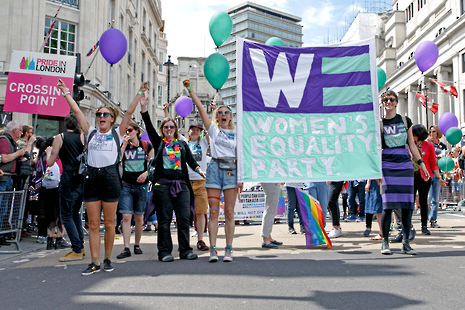Taking up space in a man’s world
Examining the ways in which gender manifests itself in society and the actions of women, Vivienne Hopley-Jones dismisses the idea that the celebration of women should be confined to a single day

Gender is something which often appears 'out there' and external. However, the way our bodies are gendered is also deeply internalised. The way we move, speak, sit; what we put ourselves forwards for, where we go, what we desire; the things that feel most personal to us as individual beings are also defined and influenced by a socially constructed gender. Yes, gender is 'out there', but it's effects and implications are deeply personal.
That we hold a day to celebrate women’s achievements and history is notable as it highlights by contrast the fact that every other day of the year is ‘international men’s day’. This in itself is deeply telling about how much space each gender respectively is expected to take up in the world; men have 364 days of the year whist we women have one.
Our feelings of worthiness and our sense of right to the space we take up profoundly effects the scope of what many individual women can achieve.
Debates about the inequalities between the sexes have, of course, been poignant in the news lately in the wake of the mounting recognition of the sexual abuse and harassment which is the plight of almost every industry, whether it's film or politics, aid organisations or simply the personal and individual experiences of women on the street.
In reaction to the coverage of ‘women’s issues’ - issues which are by no means new but certainly are only now beginning to receive the attention and outrage that they deserve - Matthew Paris on Radio 4’s The Today Programme asserted in February that he was tired of what he saw as the over-coverage of ‘women’s issues’ in the media of late. I find it ironic for a man to complain of what women have to deal with everyday of their lives; all of our news, our literature, our society tends to be filtered through a male perspective by default. On a daily basis, we hear about men, by men, largely for men, except these are not considered ‘male’ but universal.
This highlights the deeper issue at fault; the way in which there are differing expectations of the genders in relation to the occupation of space and time, news and thought. Girls are often brought up with a deeply embedded, and primarily implicit, sense of guilt at the thought of occupying space. This can be seen nowhere more overtly that in the ‘manspreading’ phenomena and surrounding debate, or perhaps more acutely in the idealised ‘size 0’ woman; a physical manifestation of the idea that women ought to take up as little physical space in the world as possible.
Our feelings of worthiness and our sense of right to the space we take up profoundly affects the scope of what many individual women can achieve, this is as true in relation to gender as it is to class, race or sexuality. Applying to Cambridge, applying for Varsity, expressing my opinions in supervisions alongside my male counterparts; I find myself repeatedly having to remind myself that I have a right to be in spaces, have a right to these opportunities. The consciousness of this process is something men do not necessarily experience.
Thus, International Women’s Day needs not only to celebrate women on this one day but remind ourselves that we have the right to celebrate ourselves outside the confines of a single day.
 News / Eight Cambridge researchers awarded €17m in ERC research grants27 December 2025
News / Eight Cambridge researchers awarded €17m in ERC research grants27 December 2025 News / Clare Hall spent over £500k opposing busway 24 December 2025
News / Clare Hall spent over £500k opposing busway 24 December 2025 Comment / League tables do more harm than good26 December 2025
Comment / League tables do more harm than good26 December 2025 Comment / The ‘class’ of Cambridge24 December 2025
Comment / The ‘class’ of Cambridge24 December 2025 News / Caius mourns its tree-mendous loss23 December 2025
News / Caius mourns its tree-mendous loss23 December 2025










